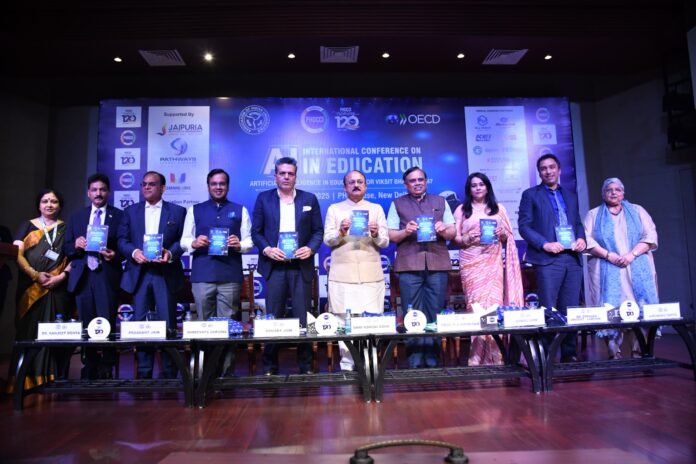New Delhi | August 1, 2025 — “AI must empower educators, not replace them,” declared Mr. Ashish Sood, Delhi’s Minister of Home, Power and Education, as he opened the PHDCCI-led International Conference on AI in Education for Viksit Bharat @2047 held in collaboration with OECD and Association of Indian Universities (AIU).
Sood emphasized AI’s role in liberating teachers from repetitive tasks to help them focus on what truly matters—inspiring and mentoring students. Referencing India’s dual aspirations under “Artificial Intelligence and Aspirational India,” he cautioned that failing to evolve could render institutions obsolete, much like Nokia.
The two-day global forum hosted at PHD House, New Delhi, convenes policymakers, academics, edtech leaders, and AI specialists to address how artificial intelligence can be ethically and strategically integrated into India’s education system in pursuit of Viksit Bharat @2047.
Policy Push for EdTech Transformation The Delhi Government’s use of AI-powered smart classrooms, gamified assessments, and upskilling teachers through AI training featured prominently in the Minister’s speech.
In his Presidential Address, Mr. Hemant Jain, President of PHDCCI, underscored that “Every industrial transformation is preceded by an educational transformation,” calling for widespread AI adoption across institutions. Echoing this view, Mr. Himanshu Gupta, Secretary of CBSE, highlighted AI’s potential in offloading routine work to restore the human connection in classrooms.
Declaring 2025 as the ‘Year of AI in Education’, Prof. T. G. Sitharam, Chairman of AICTE, urged rapid movement toward student-centric, experiential learning methods, emphasizing that the shift is tangible and immediate.
India’s Global Position in AI Policy From the international front, Dr. Stephan Vincent-Lancrin, Deputy Head at OECD, praised India’s cross-sectoral collaboration and leadership in shaping inclusive and ethical AI policy for education.
Opening remarks by Mr. Shreevats Jaipuria, Chair of PHDCCI’s Education Committee, spotlighted the promise of AI-enabled personalized learning and real-time analytics, affirming that “Teachers who harness AI will empower the next generation.”
Closing Perspectives Dr. Ranjeet Mehta, CEO & Secretary General of PHDCCI, emphasized that education must remain central to India’s development journey, with AI driving people-first outcomes. Ms. Sonali Jain, Co-Chair of the Education Committee, concluded with a powerful reminder: “AI must enhance, not diminish, the human touch in education.”
The conference also includes a hands-on workshop by Dr. Stéphan Vincent-Lancrin (OECD) and Prof. Mutlu Cukurova (UCL, UK), focused on embedding generative AI into classrooms with ethical, inclusive frameworks.





